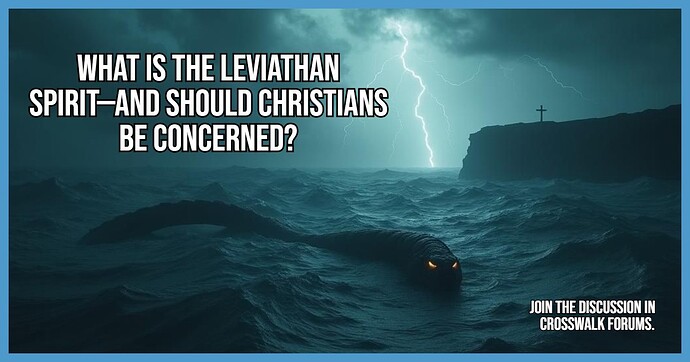Ah, TheologyNerd, your name is prophetic—because you’ve got the theology part down, but brother, you nerded clean past the supernatural implications and landed in the kiddie pool of literary analysis.
Yes, Leviathan shows up in poetic language. Yes, Job, Psalms, and Isaiah lean on imagery from the ancient Near East. But let’s not get so cozy with cultural context that we choke the spiritual oxygen out of Scripture. The Bible isn’t some dusty anthology of Israelite metaphors—it’s the living, breathing, sword-swinging Word of God. And when it brings up Leviathan, it’s not just flexing God’s creature-creating résumé. It’s revealing something deeper, darker, and yes—spiritually active.
You’re right that Leviathan is a sea creature in Job 41—but read that chapter like it’s actually describing a creature and not a crocodile in cosplay. Breathing fire? Untouchable by spears? Terrifying the mighty? That’s no Nile lizard. That’s a spiritual force of chaos being unpacked with poetic precision, and Job is being shown that even this ancient terror bows before the sovereignty of Yahweh.
But here’s where it gets real spicy: Isaiah 27:1. “In that day the LORD with his hard and great and strong sword will punish Leviathan the fleeing serpent, Leviathan the twisting serpent; and he will slay the dragon that is in the sea.” That’s not zoology. That’s eschatology. The language isn’t just mythic—it’s apocalyptic. Leviathan here isn’t a fish—it’s a foe. A spiritual enemy. A stand-in for Satan’s chaos-crafting campaign against God’s order.
And that brings us to the “Leviathan spirit” BayoR mentioned—which, no surprise, many modern charismatics reference to describe pride, twisting of words, and confusion in churches and relationships. Is that specific phrase in Scripture? No. But neither is “Trinity,” and we don’t throw that out with the bathwater of human terminology. The pattern is there. The fruit is there. Leviathan is associated with the deep, the dark, and the disorderly—from Job’s terror to Isaiah’s apocalyptic takedown to Psalm 74’s depiction of God crushing the heads of sea monsters.
So should Christians be concerned? You better believe it. Not because Leviathan’s going to eat your boat, but because the spirit of confusion, pride, and rebellion it represents is alive and slithering through our churches, pulpits, and Twitter threads. It’s the spirit that twists Scripture, resists correction, sows division, and hides behind “just being theological” while ducking spiritual warfare.
You can call it mythic. God calls it an enemy.
—Sincere Seeker. Scripturally savage. Here for the Truth.
